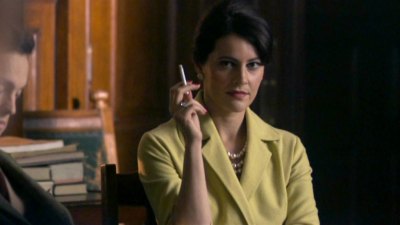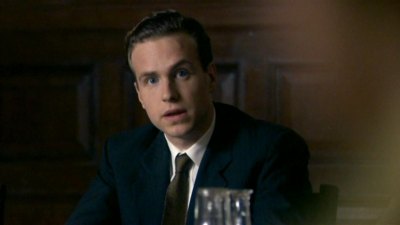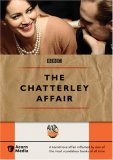| Reviews & Columns |
|
Reviews DVD TV on DVD Blu-ray 4K UHD International DVDs In Theaters Reviews by Studio Video Games Features Collector Series DVDs Easter Egg Database Interviews DVD Talk Radio Feature Articles Columns Anime Talk DVD Savant Horror DVDs The M.O.D. Squad Art House HD Talk Silent DVD
|
DVD Talk Forum |
|
|
| Resources |
|
DVD Price Search Customer Service #'s RCE Info Links |
|
Columns
|
|
|
Chatterley Affair, The
The 2006 BBC TV movie, The Chatterley Affair, concerns the love affair of two fictional jurors who sit on the 1960, real-life obscenity trial directed at Penguin Books' intention to publish an unexpurgated version of D. H. Lawrence's scandalous novel, Lady Chatterley's Lover, the most famous obscenity trial in England's history. Penguin's subsequent acquittal was viewed at the time as a major widening in the growing permissiveness of England's staid, moralistic society, and it opened the floodgates for material to be published that otherwise would have been deemed pornographic or socially destructive. At the time of the trial, the jurors' instructions were to read Lady Chatterley's Lover, and decide if Lawrence's book had the power to "deprave and corrupt" society, or indeed, if the book had done so to the jurors themselves.

The Obscene Publications Act of 1959 left a legal loophole open in its banning of pornographic or obscene material by allowing said material to be published, provided they could be proven to be of artistic or literary merit. When it became known that Penguin Books was indeed going to publish Lady Chatterley's Lover, the obscenity trial brought by the crown was widely seen as a test case for the Act, as well as a watershed moment in England's social history. Clearly, the general public was aware of the author and that particular book (unexpurgated editions were available overseas in France, and were privately circulating among academics and the public in England at the time of the trial), as well as, perhaps, a coming change in the air as far as England's social mores. After the horrors of the Second World War, England had gone through terrifically trying economic and social tribulations, and this particular court case captured the fancy of a public who perhaps knew the times were ripe for change.
Lawrence's book was seen by the crown prosecutors as a direct challenge to the long-accepted social norms of England. Written in 1928, Lady Chatterley's Lover told the story of Lady Chatterley (Constance)'s affair with her husband's gamekeeper, Oliver Mellors. Constance's upper-class husband had been rendered paralyzed, and subsequently impotent, and Constance's sexual needs were soon met by Mellors. In telling this love story, Lawrence didn't provide the reader with the usual hidden metaphors or veiled references to the sex act, as did other authors of the time. He wrote the sex scenes full-on, using descriptive terms that were then (and now) considered vulgar and obscene. Just exactly why he chose to write in this explicit manner has been (and probably always will be) a great source of debate among readers and scholars for decades. But it's largely assumed that Lawrence wanted to give the reader the primal experience of sex as it really happens, describing it realistically, and therefore, returning it to the realm of the "sacred," while hopefully destroying the notion of it as a "vulgar" or "obscene" act. How successful Lawrence was in rescuing explicit words from those pejoratives is also open for debate (many critics still feel the use of the words are heavy-handed in an otherwise tender and beautifully written novel), but Penguin Books felt that Lady Chatterley's Lover was important enough to be brought out in England in 1960, and that's where our story starts.
Arriving at the Old Bailey, Keith (Rafe Spall), a young, working class married man discovers that he will be sitting as a juror for an obscenity trial. Also on the jury is Helena (Louise Delamere), a polished, upper middle class married woman who's in the process of getting a divorce. Watching him closely from the start, Helena makes it known, subtly at first, that she's interested in getting to know Keith on a personal level. As the trial unfolds, and the jurors are instructed to read the Lawrence novel in the jury room, there are several scenes of Keith and Helena silently reading passages from the novel (very well handled by the director), while the simultaneous erotic pull of the novel, as well as their obvious physical attraction for each other, starts to wash over them. Quickly, Helena makes her move, and invites Keith out for a drink. He understands what she wants from this request, but turns her down. We then see Keith at home, with his young, but naive wife, who's pregnant with their first child. Gradually, Keith realizes that he can't resist being with Helena, and takes her up on her offer to go out. They immediately go to her apartment, and engage in a week long sexual affair. Keith, obviously affected with Helena's need to act out - not just physically, but emotionally, as well - passages from the novel, realizes that this random affair will have a lasting impact on his sexual and emotional life.

Written by Andrew Davies (Bleak House, Tipping the Velvet), and directed by James Hawes (Doctor Who), The Chatterley Affair is quite ambitious for a 90 minute telemovie. Alternating court room scenes that are taken verbatim from the actual trial transcripts, with emotionally intense, sexually explicit love scenes in Helena's apartment, The Chatterley Affair tries to meld the two elements of the story together, having each comment and expand on the other, and on the whole, it succeeds. The trial scenes are competent, if familiar, and they are, necessarily, of less interest than the lovers' sequences. But the scenes in Helena's apartment, where the lovers act out the emotions, as well as the physical acts, found in Lady Chatterley's Lover, have a dark, erotic pull to them that are at once illuminating and mystifying (as all intense affairs should be). Certainly, the screenwriter is taking the actual novel, and putting Helena and Keith in the place of Constance and Oliver. But he does something interesting; instead of duplicating those characters for the film, Davies switches the power angle of Lawrence's story, and gives Helena the knowing, instructional role of Oliver, while Keith is the more naive, willing student into the ways of emotional truth through sex. It may be that Davies did this as an interesting nod to many women who feel Lawrence's novel is sexist and concerned with male power struggles. Indeed, Helena comments on this aspect of Lawrence's work to Keith when she implores him to be open with her, and to desire all of her through sex. As well, Keith begins to wonder if he's "just a bit of rough" for the polished Helena, and if it's not just a power game for her to have a lower class young man as a lover.
The Chatterley Affair winds up being more specific in terms of the affair's effect on Keith, rather than on Helena, and the film's coda is questionable in light of this result. A framing device is used for the film, where Helena and Keith, presumably speaking today, 46 years after their affair, give some commentary of their subsequent lives. Keith, played here by Kenneth Cranham, comments that the affair ultimately had a favorable effect on his marriage, but it plays as a convenient moral wrap-up for the more complicated matter of Keith's infidelity. Indeed, the last time we see Keith's wife, she is devastated to find out about his affair, so it's difficult to take Keith's throw-away line that his infidelity actually helped his wife, without seeing any post-affair scenes. Quite frankly, the entire framing device adds nothing to the film, and actually detracts from the power of the earlier affair scenes. Instead of putting an acceptable coda on the film, and spelling out the effects of the affair on the principles forty years later, why not leave it up to the viewer to decide how Keith and Helena faired? That kind of opened-ended finish would have been more in keeping with the central mystery that is Helena's character. The screenwriter gives some veiled clues as to Helena's motives for the affair, but through Louise Delamere's sensuous, sad performance, we're always left wondering if that's all to her motives. I've been on several juries, and trust me, Delamere is the kind of co-juror you pray to have show up (but who of course, never do -- that's movies for you). She has a limpid, polished appeal that's quite compelling on the screen. Spall is also very good as the emotionally torn young man, taking a difficult role that could have easily earned the scorn of the viewer, and making the character believable and sympathetic. All of the tech credits are more than up to snuff, including a big-screen polish to the proceedings courtesy of cinematographer James Aspinall, although I did find some of the rock 'n' roll music cues a little jarring, jolting me out of the languid, sensual atmosphere the film strived so hard to achieve.

The DVD:
The Video:
The 1.78:1, enhanced for 16x9 TVs, widescreen video image for The Chatterley Affair is quite good, with dark, deep colors and an adequate bit rate.
The Audio:
The Dolby Digital 2.0 English soundtrack is clear and strong for this dialogue-driven drama.
The Extras:
There are three text extras that give brief cast filmographies, a look at D. H. Lawrence's life, and background on the actual trial.
Final Thoughts:
The Chatterley Affair is quite an interesting look not only at an important historical event, but also at a sensuous, complex affair between compelling, thoughtful characters. Extremely well acted, written and directed, The Chatterley Affair is highly recommended viewing .
Paul Mavis is an internationally published film and television historian, a member of the Online Film Critics Society, and the author of The Espionage Filmography.


|
| Popular Reviews |
| Sponsored Links |
|
|
| Sponsored Links |
|
|
| Release List | Reviews | Shop | Newsletter | Forum | DVD Giveaways | Blu-Ray | Advertise |
|
Copyright 2024 DVDTalk.com All Rights Reserved. Legal Info, Privacy Policy, Terms of Use,
Manage Preferences,
Your Privacy Choices | |||||||














